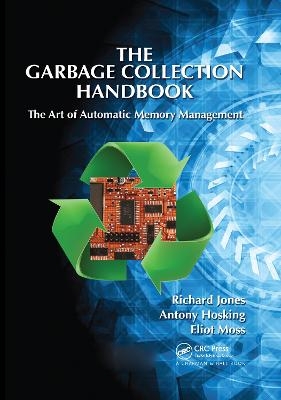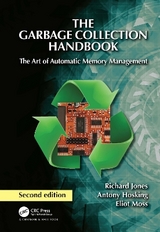
The Garbage Collection Handbook
Chapman & Hall/CRC (Verlag)
978-1-4200-8279-1 (ISBN)
- Titel gebraucht verfügbar
- Artikel merken
Published in 1996, Richard Jones’s Garbage Collection was a milestone in the area of automatic memory management. The field has grown considerably since then, sparking a need for an updated look at the latest state-of-the-art developments. The Garbage Collection Handbook: The Art of Automatic Memory Management brings together a wealth of knowledge gathered by automatic memory management researchers and developers over the past fifty years. The authors compare the most important approaches and state-of-the-art techniques in a single, accessible framework.
The book addresses new challenges to garbage collection made by recent advances in hardware and software. It explores the consequences of these changes for designers and implementers of high performance garbage collectors. Along with simple and traditional algorithms, the book covers parallel, incremental, concurrent, and real-time garbage collection. Algorithms and concepts are often described with pseudocode and illustrations.
The nearly universal adoption of garbage collection by modern programming languages makes a thorough understanding of this topic essential for any programmer. This authoritative handbook gives expert insight on how different collectors work as well as the various issues currently facing garbage collectors. Armed with this knowledge, programmers can confidently select and configure the many choices of garbage collectors.
Web ResourceThe book’s online bibliographic database at www.gchandbook.org includes over 2,500 garbage collection-related publications. Continually updated, it contains abstracts for some entries and URLs or DOIs for most of the electronically available ones. The database can be searched online or downloaded as BibTeX, PostScript, or PDF.
E-bookThis edition enhances the print version with copious clickable links to algorithms, figures, original papers and definitions of technical terms. In addition, each index entry links back to where it was mentioned in the text, and each entry in the bibliography includes links back to where it was cited.
Richard Jones is a professor of computer systems in the School of Computing at the University of Kent, Canterbury. He earned a B.A. in mathematics from Oxford University and an M.Sc. in computer science from the University of Kent. He spent a few years teaching at school and college before returning to higher education at the University of Kent. Antony Hosking is an associate professor in the Department of Computer Science at Purdue University. He earned a B.Sc. in mathematical sciences from the University of Adelaide, Australia, an M.Sc. in computer science from the University of Waikato, New Zealand, and a Ph.D. in computer science from the University of Massachusetts. His work is in the area of programming language design and implementation, with specific interests in database and persistent programming languages, object-oriented database systems, dynamic memory management, compiler optimizations, and architectural support for programming languages and applications. Eliot Moss is a professor in the Department of Computer Science at the University of Massachusetts Amherst. He earned a B.S.E.E., an M.S.E.E., and a Ph.D. in computer science from the Massachusetts Institute of Technology. After four years of military service, Dr. Moss joined the faculty at the University of Massachusetts Amherst. He works in the area of programming languages and their implementation and has built garbage collectors since 1978. In addition to his research on automatic memory management, he is known for his work on persistent programming languages, virtual machine implementation, and transactional memory. He worked with IBM researchers to license the Jikes RVM Java virtual machine for academic research, which eventually led to its release as an open source project.
Introduction. Mark-Sweep Garbage Collection. Mark-Compact Garbage Collection. Copying Garbage Collection. Reference Counting. Comparing Garbage Collectors. Allocation. Partitioning the Heap. Generational Garbage Collection. Other Partitioned Schemes. Run-Time Interface. Language-Specific Concerns. Concurrency Preliminaries. Parallel Garbage Collection. Concurrent Garbage Collection. Concurrent Mark-Sweep. Concurrent Copying and Compaction. Concurrent Reference Counting. Real-Time Garbage Collection. Glossary. Bibliography. Index.
| Erscheint lt. Verlag | 17.8.2011 |
|---|---|
| Reihe/Serie | "International Perspectives on Science, Culture and Society" |
| Zusatzinfo | 8 Tables, black and white; 79 Illustrations, black and white |
| Sprache | englisch |
| Maße | 178 x 254 mm |
| Gewicht | 1084 g |
| Themenwelt | Informatik ► Theorie / Studium ► Algorithmen |
| ISBN-10 | 1-4200-8279-5 / 1420082795 |
| ISBN-13 | 978-1-4200-8279-1 / 9781420082791 |
| Zustand | Neuware |
| Informationen gemäß Produktsicherheitsverordnung (GPSR) | |
| Haben Sie eine Frage zum Produkt? |
aus dem Bereich




